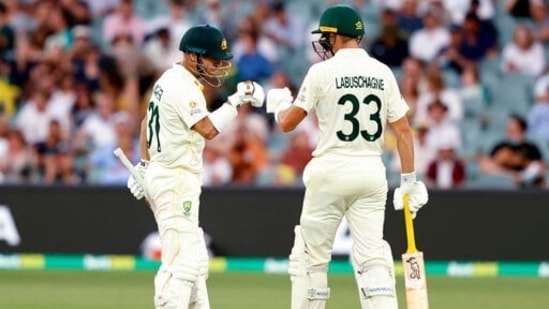Warner, Labuschagne dominate sloppy England on Day 1
Warner missed out a century for the second Test in a row but Australia were in command in the pink-ball Test in Adelaide
Steve Smith took interim charge as Australia captain more than three-and-a-half years after the ball-tampering saga that rocked Australian cricket to the core. Though the former skipper’s rehabilitation was on and he was vice-captain, he took over after skipper Pat Cummins isolated due to proximity to a Covid-positive person on the eve of the second Ashes Test in Adelaide.

Smith elected to bat in the pink-ball Test and David Warner—the other key protagonist from that scandal as Smith’s deputy—took over, offering another reminder of his importance in the Australian set-up. The left-hander curbed his aggression for large parts, and though he was out on 95—after being dismissed for 94 in the first Test in Brisbane—the hosts were in command against England at stumps.
Warner was supported by Marnus Labuschagne, who rode his luck to stay unbeaten on 95. The batsman with his myriad quirks and idiosyncrasies, will resume alongside Smith (18 batting) on Day 2 with Australia on 221/2.
Like in Brisbane, opener Marcus Harris (3) fell early. There was no extravagant movement for the bowlers to exploit, but the unwavering discipline of the four-pronged seam attack meant Australia’s batters had to swallow their ego in the opening session.
Warner, in particular, was uncharacteristically watchful. Till his 36th ball, the 35-year-old was stuck on 1. Only when Chris Woakes offered a rank bad delivery—short and wide outside off-stump—did Warner free his arms and find his first boundary. For a batter who hates being tied down, it was refreshing to see Warner—his half-century off 110 balls was his third slowest—show such flexibility even this late in his career.
Warner’s sturdy defence and shrewd judgement outside off-stump were warranted against an English attack buoyed by the return of James Anderson and Stuart Broad. The latter had made Warner look inadequate during their last duel in England in 2019, consistently probing his frailties from around the stumps. He dismissed him seven times in 10 innings and confined Warner to 95 runs at an average of 9.5 across the series. English pitches, of course, are starkly different from Australia, where the odds are stacked in his favour. Over his 88-Test career, Warner averages 64.05 at home as opposed to 33.17 away.
Once Warner and Labuschagne had negotiated an attritional opening session—Australia were 45/1 in 25 overs—runs began flowing at a steadier rate. The assistance to the English bowlers remained negligible, forcing them to hope for an error from the batters. While Anderson, Broad, Ollie Robinson and Woakes seldom have a bad day in the office, their sameness—they bowl in similar areas and operate around the 135kph mark—can make the attack look pedestrian in unhelpful conditions.
It was left to Ben Stokes to play the role of enforcer whenever Joe Root wanted to shake things up. The move almost worked shortly after the first interval. With a dominant leg-side field, Stokes resorted to banging the ball in the middle of the pitch and testing Labuschagne’s back-foot game. The Australian fell into the trap and gloved down the leg side. But wicket-keeper Jos Buttler, who had taken a sharp catch to send back Harris, misjudged a regulation chance. Instead of covering the ground with nimble footwork, he attempted a dive and frittered away a big opportunity. Labuschagne was on 21. It was the first of two chances that Buttler would squander. The second drop, which came right at the end with Labuschagne on 95, was even more glaring and epitomised England’s lack of sharpness in the field.
By the time the final session arrived, when bowlers relish the prospect of operating under floodlights due to the movement it produces, Australia were serenely placed. At 129/1, Warner and Labuschagne were attuned to the surface and in the best position to tackle any swing. There wasn’t any though given that the ball was old but only 53 overs old.
It prompted Root to return to Stokes for another spell and the move finally paid off in the 65th over. Not that they were formulating any cunning plan to remove Warner by sending down a short and wide ball outside off-stump. There was just one fielder at cover for Warner to avoid, but he somehow ended up cutting the ball straight into the hands of Broad.
With Labuschagne having already benefited from Buttler’s drops, he is determined to not repeat Warner’s mistake on Friday. “There’s a bit of disbelief (about the dropped catches). It is my job to capitalise on that now,” he said.






